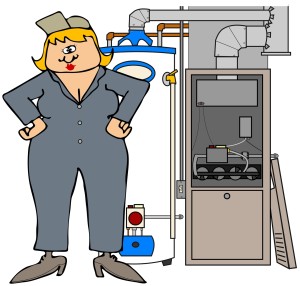

It seems that we’re finally out of Old Man Winter’s grasp. Now, there’s a guy who completely overstayed his welcome. With spring here and summer coming, it’s time to get your air-conditioning serviced.
 Seasonal maintenance is designed to check your air-conditioning and ensure that everything’s working well. It’s not a guarantee that the system will run smoothly all summer long. However, an honest technician will do his or her best to ensure that your unit is able to survive a hot, humid D.C. summer.
Seasonal maintenance is designed to check your air-conditioning and ensure that everything’s working well. It’s not a guarantee that the system will run smoothly all summer long. However, an honest technician will do his or her best to ensure that your unit is able to survive a hot, humid D.C. summer.
It’s important to be aware that some technicians are going to use this opportunity to attempt to sell you everything under the sun. Just like some auto mechanics, there are a few bad apples who can ruin the whole bunch. Here are a few air-conditioning basics so that you’ll be able to tell whether you’re being sold a bill of goods.
“Old” Equipment: Most equipment should last between 15 and 18 years. If you need to replace your equipment, then you should receive a clear, detailed explanation. Just because your equipment is old or inefficient isn’t a sufficient reason to replace it. Be wary of anyone who tells you to replace it, without giving you the option of repairing it.
Refrigerant: All units use refrigerant to provide cooling. This refrigerant is in a closed system so it should never leak out. In reality, you have to add a little bit every few years because we don’t live in a perfect world. You should never have to top off the unit every year, nor should you put several pounds in without first fixing the leak. If your unit uses R-22, also known as Freon, then you need to be aware that it is being phased out and is currently very expensive. The new standard refrigerant is R-410A, also known as Puron. You will have to replace equipment in order to switch to this refrigerant.
There also exist “drop-in” replacement refrigerants. These are designed to replace R-22 without any modification. Treat these with the same respect that you treat infomercial products.
Capacitors and Contactors: Both of these parts are likely to be replaced every few years. A capacitor is basically a battery that helps run the compressor and the fan motor, and the contactor is the switch that turns the system on. These fail occasionally, but not frequently. If you’re changing them often, then it’s a sign that something else is failing on the system.
Compressors: This is the heart of your air-conditioning system. There are three main causes of compressor failure: (1) mechanical failure, when your system doesn’t pump refrigerant anymore; (2) electrical failure, when a motor winding has failed (don’t worry about what it is, just listen for those words); and (3) “grounding out,” when the internal wires are touching the metal casing. For the first two, the system will turn on, but not function. Grounding out causes the system to blow the fuses and the circuit breaker every time the unit is turned on.
Corey Rodgerson is the Service Manager at Climate Heating & Cooling, Inc., serving D.C., Maryland, and Virginia.